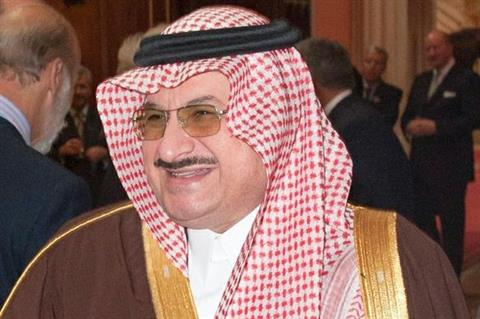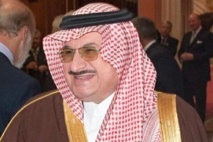The crisis in Syria continues unabated. There have been over 100,000 civilian deaths. Most shockingly of all, the Oxford Research Group reports that of the 11,000 victims under 17 and under, more than 70 percent were killed by air strikes and artillery shells deliberately targeting civilian areas.
While international efforts have been taken to remove the weapons of mass destruction used by the murderous regime of Bashar al-Assad, surely the West must see that the regime itself remains the greatest weapon of mass destruction of all? Chemical weapons are but a small cog in Mr. Assad’s killing machine. While he may appear to be going along with every international initiative to end the conflict, his regime will continue to do everything in its power to frustrate any serious solution.
The Assad regime is bolstered by the presence of Iranian forces in Syria. These soldiers did not enter Syria to protect it from a hostile external occupation; they are there to support an evil regime that is hurting and harming the Syrian people. It is a familiar pattern for Iran, which has financed and trained militias in Iraq, Hezbollah terrorists in Lebanon and militants in Yemen and Bahrain.
And yet rather than challenging the Syrian and Iranian governments, some of our Western partners have refused to take much-needed action against them. The West has allowed one regime to survive and the other to continue its program for uranium enrichment, with all the consequent dangers of weaponization.
This year’s talks with Iran may dilute the West’s determination to deal with both governments. What price is “peace” though, when it is made with such regimes?
The foreign policy choices being made in some Western capitals risk the stability of the region and, potentially, the security of the whole Arab world. This means the Kingdom of Saudi Arabia has no choice but to become more assertive in international affairs: more determined than ever to stand up for the genuine stability our region so desperately needs.
Saudi Arabia has enormous responsibilities within the region, as the cradle of Islam and one of the Arab world’s most significant political powers. We have global responsibilities — economic and political — as the world’s de facto central banker for energy. And we have a humanitarian responsibility to do what we can to end the suffering in Syria.
We will act to fulfill these responsibilities, with or without the support of our Western partners. Nothing is ruled out in our pursuit of sustainable peace and stability in the Arab World as King Abdullah — then Saudi Arabia’s Crown Prince — showed with his leadership of the 2002 Arab Peace Initiative to resolve the Israeli-Palestinian conflict.
We showed our preparedness to act independently with our decision to reject a seat on the United Nations Security Council. What point was there in serving in an international talking shop when so many lives are threatened, and so many opportunities for peace and security are being thwarted by the U.N.’s inability to act?
We continue to show our determination through our support for the Free Syrian Army and the Syrian opposition. It is too easy for some in the West to use the threat of Al Qaeda’s terrorist operations in Syria as an excuse for hesitation and inaction. Al Qaeda’s activities are a symptom of the international community’s failure to intervene. They should not become a justification for inaction. The way to prevent the rise of extremism in Syria — and elsewhere — is to support the champions of moderation: financially, materially and yes, militarily, if necessary. To do otherwise is to walk on by, while a humanitarian disaster and strategic failure continue to fester.
Saudi Arabia will continue on this new track for as long as proves necessary. We expected to be standing shoulder to shoulder with our friends and partners who have previously talked so much about the importance of moral values in foreign policy. But this year, for all their talk of “red lines,” when it counted, our partners have seemed all too ready to concede our safety and risk our region’s stability.
------------------------------------------------------------------------------------
Mohammed bin Nawaf bin Abdulaziz al Saud is Saudi Arabia’s ambassador to Britain.
While international efforts have been taken to remove the weapons of mass destruction used by the murderous regime of Bashar al-Assad, surely the West must see that the regime itself remains the greatest weapon of mass destruction of all? Chemical weapons are but a small cog in Mr. Assad’s killing machine. While he may appear to be going along with every international initiative to end the conflict, his regime will continue to do everything in its power to frustrate any serious solution.
The Assad regime is bolstered by the presence of Iranian forces in Syria. These soldiers did not enter Syria to protect it from a hostile external occupation; they are there to support an evil regime that is hurting and harming the Syrian people. It is a familiar pattern for Iran, which has financed and trained militias in Iraq, Hezbollah terrorists in Lebanon and militants in Yemen and Bahrain.
And yet rather than challenging the Syrian and Iranian governments, some of our Western partners have refused to take much-needed action against them. The West has allowed one regime to survive and the other to continue its program for uranium enrichment, with all the consequent dangers of weaponization.
This year’s talks with Iran may dilute the West’s determination to deal with both governments. What price is “peace” though, when it is made with such regimes?
The foreign policy choices being made in some Western capitals risk the stability of the region and, potentially, the security of the whole Arab world. This means the Kingdom of Saudi Arabia has no choice but to become more assertive in international affairs: more determined than ever to stand up for the genuine stability our region so desperately needs.
Saudi Arabia has enormous responsibilities within the region, as the cradle of Islam and one of the Arab world’s most significant political powers. We have global responsibilities — economic and political — as the world’s de facto central banker for energy. And we have a humanitarian responsibility to do what we can to end the suffering in Syria.
We will act to fulfill these responsibilities, with or without the support of our Western partners. Nothing is ruled out in our pursuit of sustainable peace and stability in the Arab World as King Abdullah — then Saudi Arabia’s Crown Prince — showed with his leadership of the 2002 Arab Peace Initiative to resolve the Israeli-Palestinian conflict.
We showed our preparedness to act independently with our decision to reject a seat on the United Nations Security Council. What point was there in serving in an international talking shop when so many lives are threatened, and so many opportunities for peace and security are being thwarted by the U.N.’s inability to act?
We continue to show our determination through our support for the Free Syrian Army and the Syrian opposition. It is too easy for some in the West to use the threat of Al Qaeda’s terrorist operations in Syria as an excuse for hesitation and inaction. Al Qaeda’s activities are a symptom of the international community’s failure to intervene. They should not become a justification for inaction. The way to prevent the rise of extremism in Syria — and elsewhere — is to support the champions of moderation: financially, materially and yes, militarily, if necessary. To do otherwise is to walk on by, while a humanitarian disaster and strategic failure continue to fester.
Saudi Arabia will continue on this new track for as long as proves necessary. We expected to be standing shoulder to shoulder with our friends and partners who have previously talked so much about the importance of moral values in foreign policy. But this year, for all their talk of “red lines,” when it counted, our partners have seemed all too ready to concede our safety and risk our region’s stability.
------------------------------------------------------------------------------------
Mohammed bin Nawaf bin Abdulaziz al Saud is Saudi Arabia’s ambassador to Britain.









 Home
Home Politics
Politics











